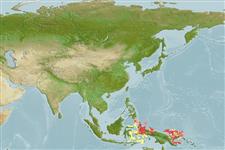>
Scombriformes (Mackerels) >
Trichiuridae (Cutlassfishes) > Aphanopodinae
Etymology: Benthodesmus: Greek, benthos = depth of the sea + Greek, desmos = bond, chain (Ref. 45335).
Environment: milieu / climate zone / depth range / distribution range
Ecologia
marinhas bentopelágico; intervalo de profundidade 200 - 1000 m (Ref. 6181). Deep-water; 5°N - 9°S, 121°E - 154°E (Ref. 6181)
Western Central Pacific: Halmahera and Flores Sea in Indonesia; north of New Guinea.
Tamanho / Peso / Idade
Maturity: Lm ? range ? - ? cm
Max length : 23.0 cm SL macho/indeterminado; (Ref. 6181)
Espinhos dorsais (total) : 34 - 35; Raios dorsais moles (total) : 85 - 90; Espinhos anais: 2; Raios anais moles: 80 - 84; Vértebras: 126 - 129. Body silvery, jaws and opercle blackish. The inside of the mouth and gill cavities black.
Probably benthopelagic, juveniles mesopelagic from 200 to 800 m depth (Ref. 9688).
Life cycle and mating behavior
Maturities | Reprodução | Spawnings | Egg(s) | Fecundities | Larvas
Nakamura, I. and N.V. Parin, 1993. FAO Species Catalogue. Vol. 15. Snake mackerels and cutlassfishes of the world (families Gempylidae and Trichiuridae). An annotated and illustrated catalogue of the snake mackerels, snoeks, escolars, gemfishes, sackfishes, domine, oilfish, cutlassfishes,. scabbardfishes, hairtails, and frostfishes known to date. FAO Fish. Synop. 125(15):136 p. (Ref. 6181)
Categoria na Lista Vermelha da IUCN (Ref. 130435)
Ameaça para o homem
Harmless
Utilização humana
Ferramentas
Relatórios especiais
Descarregue XML
Fontes da internet
Estimates based on models
Preferred temperature (Ref.
123201): 8.1 - 12.3, mean 8.3 °C (based on 17 cells).
Phylogenetic diversity index (Ref.
82804): PD
50 = 0.5005 [Uniqueness, from 0.5 = low to 2.0 = high].
Bayesian length-weight: a=0.00046 (0.00020 - 0.00105), b=3.12 (2.92 - 3.32), in cm total length, based on LWR estimates for this (Sub)family-body shape (Ref.
93245).
Nível Trófico (Ref.
69278): 3.8 ±0.6 se; based on size and trophs of closest relatives
Resiliência (Ref.
120179): Médio, tempo mínimo de duplicação da população 1,4 - 4,4 anos (Assuming tmax>3).
Fishing Vulnerability (Ref.
59153): Low vulnerability (18 of 100).
